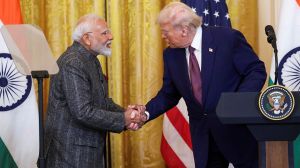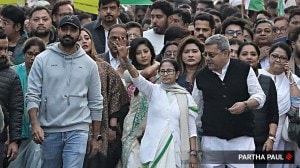To PM, Sonia, Advani
Will you help yourself and your country? Ten years after Pokharan, nuclear deal has three more weeks to live

Even as India is observing the 10th anniversary of the Pokharan II tests which proclaimed this nation a nuclear weapon state, the nuclear future of this country is becoming increasingly doubtful. Our nuclear reactors are operating at 50 per cent capacity and if the Indo-US nuclear deal is not signed and the technology denial against India is not lifted as a result, India8217;s three-stage nuclear programme and ambitions of using the country8217;s abundant thorium supplies for nuclear power will receive a severe setback and will be delayed by several decades.
Three parties will decide India8217;s nuclear future 8212; the Congress, the BJP and the communists. The Congress and the BJP have a continuity in policy since Rajiv Gandhi initiated weaponisation in March 1989. The Pokharan II testing of Atal
Bihari Vajpayee is a continuation of P.V. Narasimha Rao8217;s attempt to test in 1995. The Indo-US nuclear deal is a continuation and further enlargement by the Congress of the BJP initiative of Next Steps in Strategic Partnership with the United States. Both the Congress and the BJP are committed to seeing India as one of the major balancers of power in the international system and to developing the self-reliant three-stage nuclear programme that Homi J. Bhabha envisioned. The communists are not in favour of Indian nuclear weapons, India8217;s nuclear future and India as a major balancer of power with an independent foreign policy. As faithful members of the communist ummah they want China to dominate Asia, and the world ultimately, and they would like India to play a subordinate role.
Today, the three parties are engaged in a strategic game to determine India8217;s nuclear future. Let us look at the stakes of the three parties and their options. The communists either clear the finalisation of the IAEA agreement in the May 28 meeting or announce the withdrawal of their support and maintain their opposition to furthering the deal. They may also try to extend the negotiations, to strangulate the deal through delays.
The Congress may go along with the Left parties to retain their support for a few more months and not pursue the finalisation of the IAEA agreement and let it slip. Thereby the Congress will become the target of the BJP8217;s election propaganda that it was really the Left that was ruling the country, using the Congress as surrogate and that India8217;s entire nuclear future has been sacrificed to accommodate the Left. Or the Congress can part company with the Left and go ahead with the IAEA safeguards finalisation. All that will mean, at worst, is the elections being advanced to November. The Congress will have to weigh the costs and benefits of staying for five or six months more in office and getting attacked during the election campaign for having sacrificed India8217;s nuclear future and having been a surrogate of the communist ummah with its loyalty to Beijing.
At the present stage in the game, the BJP has maximum flexibility. It can continue its present opposition to the nuclear deal and earn the reputation of having contributed to the Indian nuclear programme being wound down and share that responsibility with the Congress and the communists. Alternatively, it can announce that it supports the deal and would like the Congress to complete it. That would be rising to the level of Narasimha Rao, in commitment to national interest. Rao urged Vajpayee to conduct the nuclear tests without worrying about the credit going to him.
If the BJP were to do that, the Congress will be in a dilemma. It cannot reject the offer and be criticised as the party that killed India8217;s nuclear programme in spite of the BJP8217;s efforts to save it. The BJP can take the credit of having rescued
India8217;s nuclear future from the certain death planned for it by the communists and from the indifferent Congress that did not assert itself adequately to save it. It is also in the BJP8217;s interest to drive as big a wedge between the Congress and the communists ahead of elections.
While the above analysis deals with party interests and options, the game also involves three individuals 8212; Manmohan Singh, Sonia Gandhi and L.K. Advani. Singh is a prime minister by accident and he cannot be relishing the prospect of going down in history as the PM who destroyed India8217;s international credibility and wound down Indian civil nuclear power. For him, his reputation in history should be more important than his continuance in office. He is in a position to tell the Congress leadership to choose between his continuance as PM and a few more months of the UPA tenure with communist support at the cost of scuttling the Indo-US deal. For Sonia Gandhi, the choice is between some more months in office for the UPA and at the end of it facing attack during the elections for having pushed India8217;s civil nuclear programme into a coma and having been manipulated by the leftists and sacrificed economic reform at their behest, and elections a few months in advance with the enhanced reputation of having stood up to the Left. For Advani, it is a choice between going down in history as Vajpayee8217;s former deputy who contributed to the winding down of the nuclear programme when he had an opportunity to save it, and offering to support the nuclear deal so that he can claim to have preserved the Vajpayee legacy of having made India into a nuclear state and one of the balancers of power in the world.
Between now and May 28, the Congress may announce its decision to go ahead with the IAEA safeguards and may leave it to the communists to withdraw support 8212; and that will not cause much damage. They can dare the BJP to oppose the deal when the uranium crunch has compelled our reactors to run at 50 per cent capacity. That calls for rare courage on Sonia Gandhi8217;s part, such as the kind she displayed when she stepped aside to make Manmohan Singh the prime minister.
The next three weeks will show how this game for India8217;s nuclear future will unfold. The East India Company occupied this country without bringing in a large invading army. By fighting among themselves, the Indian maharajahs and nawabs handed over the country to the Company. Are we going to see a repeat of that because of the parochial infighting among our major political parties?
The writer is a senior defence analyst
ambimanigmail.com
- 01
- 02
- 03
- 04
- 05































